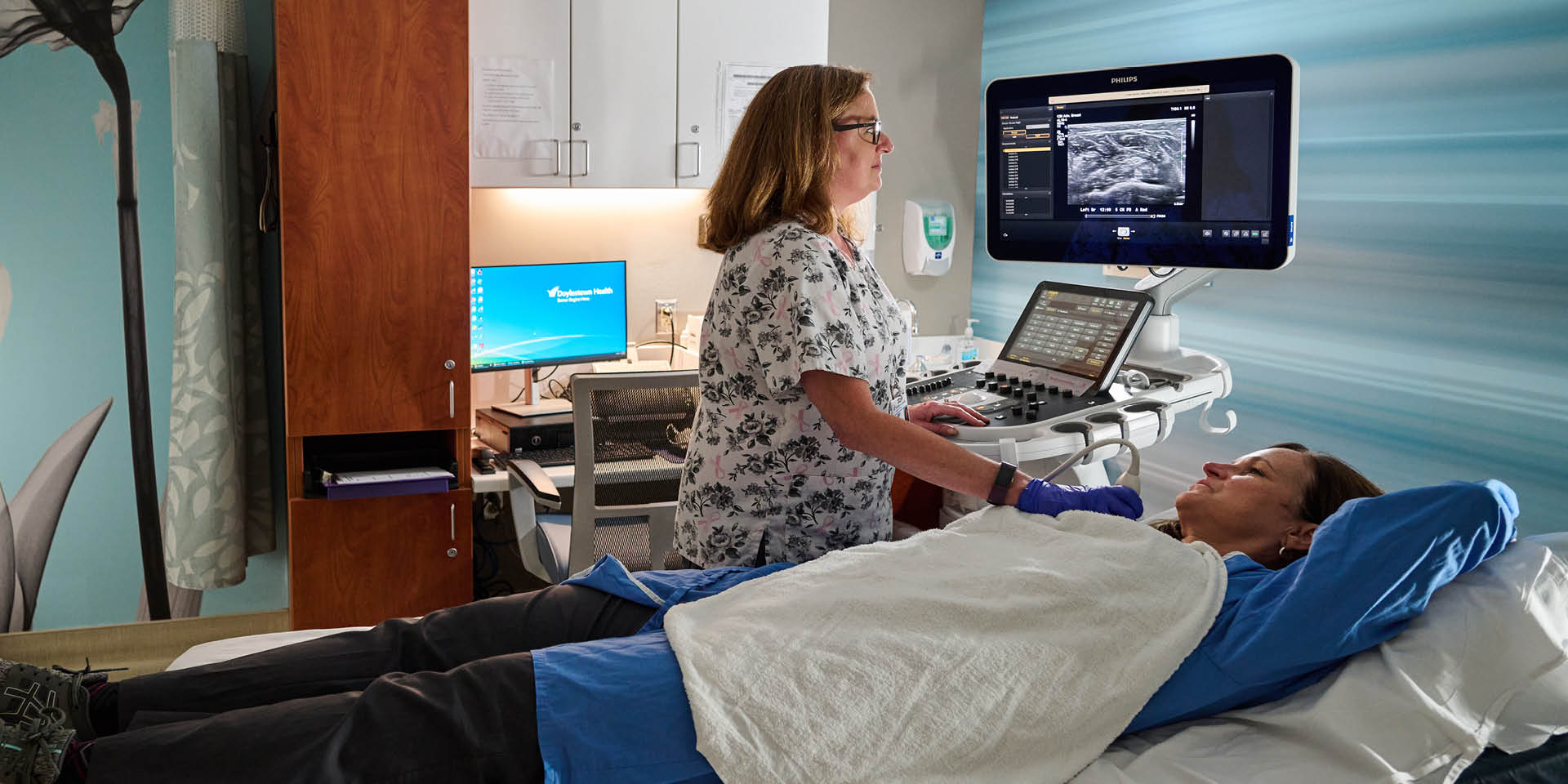In 2004, Dr. Nancy Cappello, an education specialist from Connecticut was diagnosed with advanced stage breast cancer after a decade of normal mammograms, including one performed a few months prior to her diagnosis. Dr. Cappello discovered she had dense breast tissue, which masked her cancer on mammograms. While she eventually succumbed to breast cancer, she worked tirelessly for three years to standardize the communication of breast density to Connecticut women.
Now, the United States Food and Drug Administration (FDA) requires all healthcare systems inform women about their breast density. Breast density results are a standard part of all mammogram reports performed at Doylestown Health’s Clark Center for Breast Imaging and other healthcare systems nationwide.
“Study after study has shown that high breast density is an independent risk factor for the development of breast cancer, and that it is the strongest predictor of the failure of mammography to detect breast cancer,” says Doylestown Health Breast Surgeon Donna Angotti, MD.
What is Breast Density?
Your breasts are made up of various types of tissue. Glandular tissue contains ducts to transport milk, fibrous tissue is the connector between different types of tissue, and fatty tissue acts as a filler and gives breasts their shape. Breast density is measured by how much fibrous and glandular tissue you have compared to fat tissue.
If you have a higher amount of fibrous and glandular tissue compared to fatty tissue, your breasts are considered dense. On a mammogram, fatty tissue appears black and dense tissue appears white. Any potential issues on a mammogram generally show up as white, so the dense breast tissue could mask certain concerns.
Dense breast tissue is normal and occurs in nearly half of all women over 40. Typically, breast density decreases as you age. Only 25% of women over 60 have dense breast tissue.
Know Your Breast Density
The doctor reading your mammogram will determine your breast density results and include them as part of your yearly mammogram. Breast density is broken into four categories:
- Category A is classified as breasts that are made up of almost all fatty tissue.
- Category B is identified areas of dense breast tissue.
- Category C is called heterogeneously dense breast tissue and is comprised of dense and fatty tissue with dense tissue as the majority.
- Category D is extremely dense breast. In this cases, mammograms appear almost completely white. Only 10 percent of women have breast tissue in this category.
Women in category C and D are considered to have dense breasts. Your breast density will be included in your mammogram result report. It will be marked as either dense breasts or not dense breasts. If you have any questions, you can follow up with your physician.
What to Do If You Have Dense Breasts
If you have dense breasts, Dr. Angotti says you should talk to your healthcare provider about additional screenings, but still suggests mammograms. “Mammography is still a valuable tool in screening for breast cancer and should not be abandoned, but additional modalities should be considered. Your physician can help you determine what tests would best fit your situation and goals,” she says.
Doylestown Health’s Clark Center for Breast Imaging offers a wide-range of screening and diagnostic tests for breast cancer at two convenient locations in Warrington and Doylestown. Some of the advanced screening tools include:
- Breast magnetic resonance imaging (MRI) –often used as an imaging study to investigate concerns found in a mammogram.
- Breast ultrasound –done in combination with a mammogram. It can be helpful to find cancers that may be obscured in a mammogram.
- Digital breast tomosynthesis (DBT) –also called a 3D mammogram. The DBT provides images of the breast in various angles, which makes some abnormalities easier to see.
According to Dr. Angotti, your breast screenings should be discussed with your healthcare provider and given careful consideration. “Some tests, such as MRI of the breast, have an excellent ability to detect cancer, but a lower ability to distinguish cancer from other lesions that are benign. This can create anxiety and stress for a woman and is why an emphasis on shared decision making is so important,” she says.
To learn more about breast cancer screenings and breast cancer screening tools available at Doylestown Health, visit Doylestown Health’s Clark Center for Breast Imaging or call 215-345-2274.
Meet the Provider

Dr. Donna Angotti is a board-certified, fellowship-trained breast surgeon who specializes in breast health, the diagnosis and treatment of breast cancer and the care of high-risk patients. She is Medical Director of the Breast Cancer Program at Doylestown Health's Cancer Institute.
About Penn Medicine Doylestown Health Cancer Institute
The PMDH Cancer Institute offers patients the quality care they expect from a leader in cancer diagnosis and treatment - close to home. Accredited by the American College of Surgeons Commission on Cancer our board-certified physicians and oncology-certified practitioners provide comprehensive, coordinated care and services for the full range of cancer diagnoses including breast, lung, urologic, gastrointestinal and other cancers.
